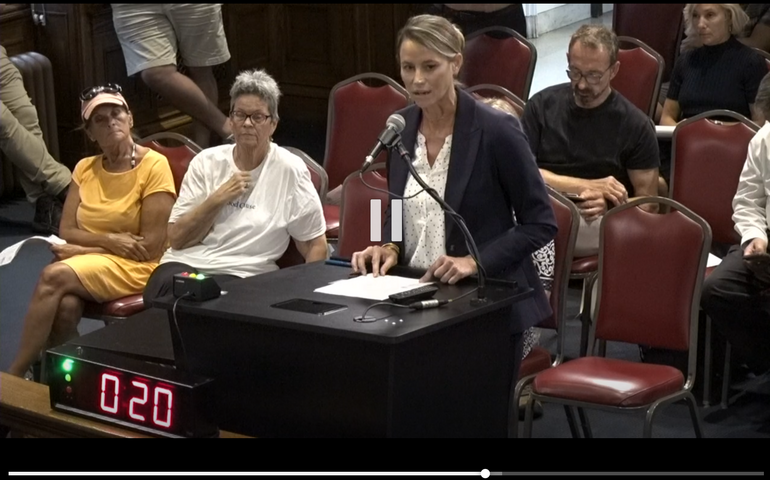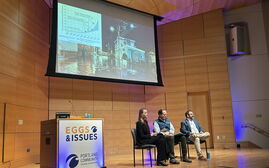Portland City Council sends minimum wage proposal to voters
 Screen shot from Portland City Council video recording
Quincy Hentzel, CEO of Portland Regional Chamber, was one of 30 speakers at a public hearing on a proposed wage hike Monday night.
Screen shot from Portland City Council video recording
Quincy Hentzel, CEO of Portland Regional Chamber, was one of 30 speakers at a public hearing on a proposed wage hike Monday night.
Portland City Council voted Monday night to put a minimum wage proposal on the November ballot.
Portland voters will get their say in a November referendum whether to raise the city’s minimum wage from $15.50 per hour to $19 by 2028.
The new rate, if approved by city voters, would give Portland one of the highest minimum wages in the country. It would also be significantly higher than Maine's minimum wage of $14.65 per hour.
The original proposal was to increase the hourly rate to $20 per hour by 2029, but Council members Kate Sykes and Regina Phillips on Monday submitted an amendment to lower the wage hike to what Sykes called “an economic sweet spot — 60% of the median wage of what workers earn in Portland.”
Sykes said the amended pay increase would “help workers without damaging nonprofits and small businesses.”
Pushback from businesses, nonprofits
But representatives from nonprofits and small businesses who spoke at Monday night’s public hearing said any wage hike was unsustainable and might prompt them to close or to move out of Portland.
Jennifer Dearborn with Port Resources said a wage increase for her 70 employees would cost the nonprofit an additional $350,000 per year, with no additional funding to support raises from Maine Care.
Tamara Gallagher, who runs Growing Tree Childcare in Portland, said the increase would cost her families, whose budgets are already tight, an additional $50 per child per week. “Why would they pay that when they can go to Westbrook or South Portland?” she asked.
Quincy Hentzel, CEO of the Portland Regional Chamber of Commerce, said the proposed wage increase would amount to a 30% jump in labor costs and “could be the breaking point for child care, social services and medical care. They’ll be forced to move."
“Large corporations may be able to absorb this, but small businesses, which are the backbone of our economy, cannot," she added.
Restaurateur Steve DiMillo said that a wage hike would put Portland businesses at “a big competitive disadvantage with neighboring towns.”
DiMillo was one of several speakers who argued that the minimum wage should be adjusted at the national or state level, not by individual municipalities.
Several small business owners noted that Portland’s minimum wage, when last increased from $12 by voter referendum in 2020, effective in 2022, already incorporates annual hikes tied to the Consumer Price Index.
David Turin, who owns David’s restaurant on Monument Square, said having the rate tied to inflation is “a good plan. Leave it alone.”
Turin added, “We all want workers to make more and to be able to live in Portland. But every other city in the U.S. that has raised its minimum wage has seen an increase in homelessness and business losses.”
Brian Batson, community relations manager at MaineHealth, also urged the Council to reject the proposal, predicting the wage hike would add $23 million to the state’s health care costs.
“Maine hospitals are the most financially strained in the entire country. Nine hospitals have already closed their birthing centers," Batson said.
The University of New England’s costs would increase by $250,000 per year under the proposed wage hike, according to Ed Cervone, vice president for institutional advancement.
“We don’t have the option to raise prices, in fact we’ve been looking to lower costs because of the current economy. The nonprofits and higher education institutions are getting hammered by this administration," Cervone said. “We are sympathetic to the rising cost of living, but a more effective piece would be to help more people achieve affordable housing.”
Council member Phillips commented before voting to send the amended proposal to voters, “The city is doing a good job of building affordable housing, but a lot of people cannot afford to live in Portland.
“I’ve been flooded with people asking me to vote against this; it’s a difficult issue. But we have to do something for the renters.”
Worker viewpoint
Roughly half of the 30 speakers who commented during the 90-minute public hearing, spoke about the high cost of living in Portland, which some said had driven them and friends to move out of town. Buddy Moore said one of his co-workers “was literally selling his plasma to make rent.”
Another commented, “It’s not the City Council’s job to look after the welfare of small businesses. Thousands of workers in Portland stand to benefit from this.”
Council member Benjamin Grant, who voted against the wage hike along with Pious Ali, Mark Dion and Sarah Michniewicz, said he encouraged workers to unionize to increase wages.
"That’s a path forward," Grant said. “I’m very pessimistic about where we are right now. Nonprofits are staring into an abyss and could face an apocalypse .... I've seen the minimum wage increased 17 times since I moved to Maine 25 years ago. This has to go slower. We have to be patient.”
If approved by voters in November, the pay rate would increase to $16.75 in 2026, $17.75 in 2027 and $19 in 2028. After that, the wage would be adjusted annually for inflation.
Michael Goldman, counsel for the city, noted that the proposal does allow for the wage hike, if approved, to be amended by City Council at any time, without sending it back to the ballot box.













0 Comments